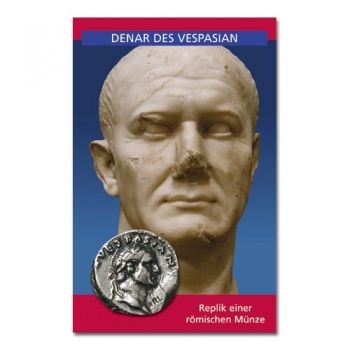Denarius of Vespasian - Roman Coin Replica
Denarius of Vespasian
Obverse: Showing the head of Vespasian with laurel wreath and the inscription R VESPASIANV. On completely preserved coins the text reads Imp(erator) Caesar Vespasianus Aug(ustus).
Reverse: Head of Titus on the left and his brother Domitian facing each other, with the inscription: CAESAR AVG(usti) F(ilius) CO(n)S(ul) CA[ES]AR AVG(usti) F(ilius) PR(aetor), i.e.: Caesar, son of Vespasian, Consul (title of Titus) as well as Caesar, son of Augustus, Praetor (title of Domitian).
Minted in Lugdunum (Lyon) in 70/71.
Material: Pewter alloy with patination.
All coin replicas were cast from originals. They are available individually or in different sets.
Surviving prices for the 1st and 2nd century
1 aureus = 25 denarii,
1 denarius = 25 sestertii,
1 sestertius = 2 dupondii,
1 Dupondius = 2 Ass.
A pig costs 75 denarii
"Pecunia non olet!" - Money does not stink
Emperor Vespasian had taken over from his predecessor Nero a state that was almost bankrupt.
Vespasian reorganised the public budgets with great success. His ingenuity in increasing state revenues was great. Among other things, he introduced a tax on public latrines. When his son Titus objected to this, he held some coins from the tax revenue under his nose and asked if this smell bothered him. Titus had to concede that the money did not stink: Pecunia non olet.
The saying has persisted to this day to justify the possession of money from dubious sources of revenue. The public toilets in Paris are still called "Vespasienne" today. In Italy, too, the public toilets are called "Vespasiani".

